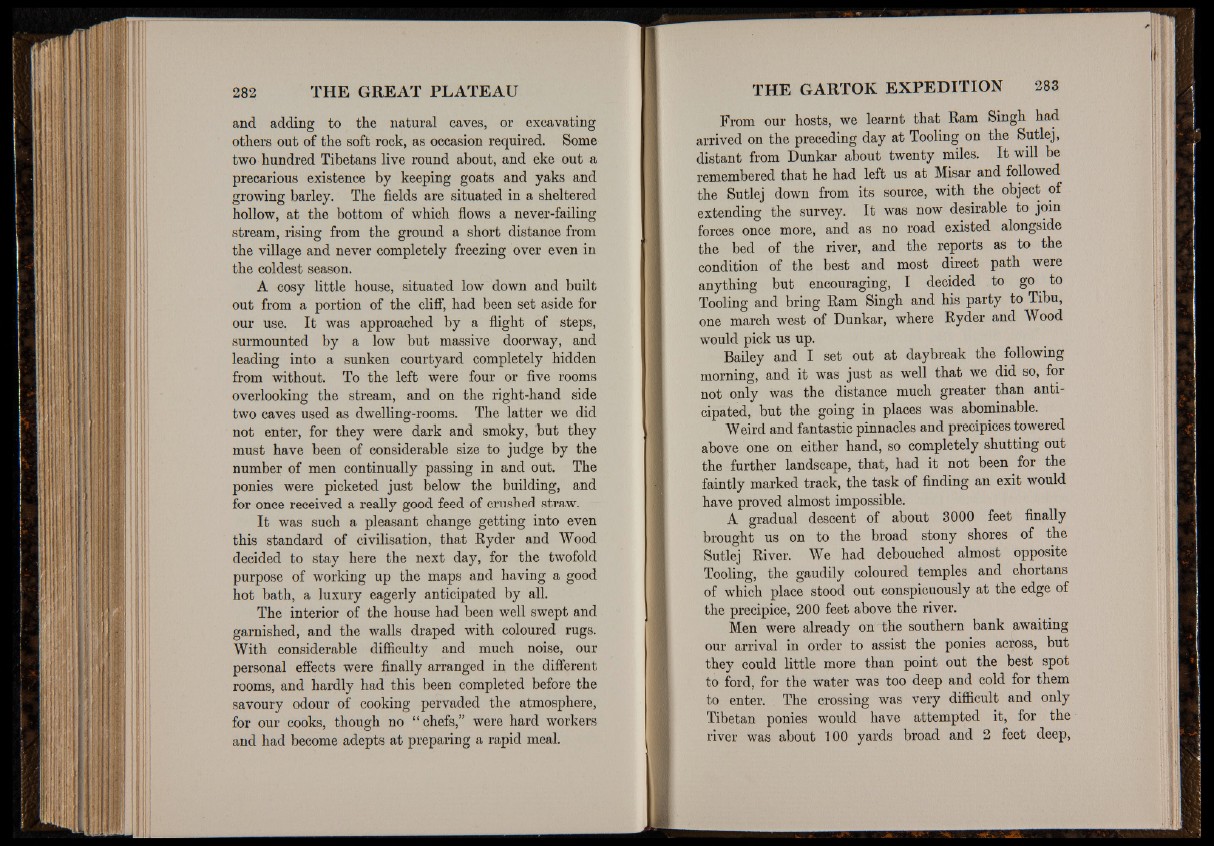
and adding to the natural caves, or excavating
others out of the soft rock, as occasion required. Some
two hundred Tibetans live round about, and eke out a
precarious existence by keeping goats and yaks and
growing barley. The fields are situated in a sheltered
hollow, at the bottom of which flows a never-failing
stream, rising from the ground a short distance from
the village and never completely freezing over even in
the coldest season.
A cosy little house, situated low down and built
out from a portion of the cliff, had been set aside for
our use. It was approached by a flight of steps,
surmounted by a low but massive doorway, and
leading into a sunken courtyard completely hidden
from without. To the left were four or five rooms
overlooking the stream, and on the right-hand side
two caves used as dwelling-rooms. The latter we did
not enter, for they were dark and smoky, but they
must have been of considerable size to judge by the
number of men continually passing in and out. The
ponies were picketed just below the building, and
for once received a really good feed of crushed straw.
It was such a pleasant change getting into even
this standard of civilisation, that Ryder and Wood
decided to stay here the next day, for the twofold
purpose of working up the maps and having a good
hot bath, a luxury eagerly anticipated by all.
The interior of the house had been well swept and
garnished, and the walls draped with coloured rugs.
With considerable difficulty and much noise, our
personal effects were finally arranged in the different
rooms, and hardly had this been completed before the
savoury odour of cooking pervaded the atmosphere,
for our cooks, though no “ chefs,” were hard workers
and had become adepts at preparing a rapid meal.
From our hosts, we learnt that Ram Singh had
arrived on the preceding day at Tooling on the Sutlej,
distant from Dunkar about twenty miles. I t will be
remembered that he had left us at Misar and followed
the Sutlej down from its source, with the object of
extending the survey. It was now desirable to join
forces once more, and as no road existed alongside
the bed of the river, and the reports as to the
condition of the best and most direct path were
anything but encouraging, I decided to go to
Tooling and bring Ram Singh and his party to Tibu,
one march west of Dunkar, where Ryder and Wood
would pick us up.
Bailey and I set out at daybreak the following
morning, and it was just as well that we did so, for
not only was the distance much greater than anticipated,
but the going in places was abominable.
Weird and fantastic pinnacles and precipices towered
above one on either hand, so completely shutting out
the further landscape, that, had it not been for the
faintly marked track, the task of finding an exit would
have proved almost impossible.
A gradual descent of about 3000 feet finally
brought us on to the broad stony shores of the
Sutlej River. We had debouched almost opposite
Tooling, the gaudily coloured temples and chortans
of which place stood out conspicuously at the edge of
the precipice, 200 feet above the river.
Men were already on the southern bank awaiting
our arrival in order to assist the ponies across, but
they could little more than point out the best spot
to ford, for the water was too deep and cold for them
to enter. The crossing was very difficult and only
Tibetan ponies would have attempted it, for the
river was about 100 yards broad and 2 feet deep,